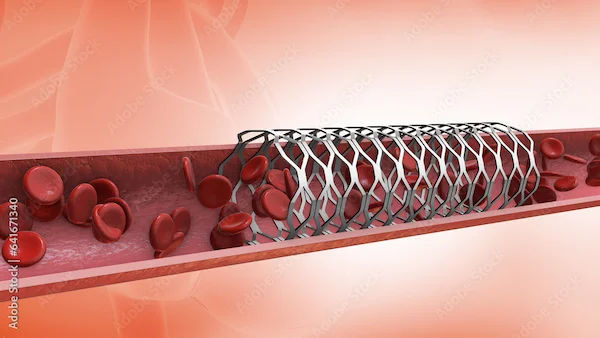Stent and Bypass Surgery: What’s the Difference?
Learn the difference between stent placement and bypass surgery. Discover how each procedure may help restore blood flow to the heart and what might suit your condition best.

Written by Dr. Rohinipriyanka Pondugula
Reviewed by Dr. Siri Nallapu MBBS
Last updated on 13th Jan, 2026

Introduction
Heart health is crucial, and when blockages in the arteries restrict blood flow, doctors may recommend procedures like stent placement or bypass surgery. Both aim to improve blood circulation to the heart but work differently. If you or a loved one is facing this decision, understanding the difference can help you make an informed choice.
What Are Stents and Bypass Surgery?
Understanding each procedure might help you make a more informed decision.
1. Stent (Angioplasty with Stent Placement)
A stent is a small mesh tube inserted into a narrowed artery to keep it open. The process, known as angioplasty, involves threading a catheter into the blocked artery, inflating a balloon to open it up, and placing a stent to maintain the widened passage.
Best for: Patients with 1 or 2 blockages in smaller arteries.
2. Bypass Surgery (CABG Coronary Artery Bypass Grafting)
Bypass surgery creates a new path for blood to flow around a blocked artery. Surgeons take a healthy blood vessel, usually from the leg, arm, or chest, and attach it above and below the blockage, creating a "detour."
Best for: Patients with multiple or severe blockages, especially in major arteries.
Consult Top Specialists for Personalised Heart Health Advice
Key Differences Between Stent and Bypass Surgery
Here's a quick comparison to understand how the two procedures differ:
| Feature | Stent (Angioplasty) | Bypass Surgery (CABG) |
| Procedure | Minimally invasive (no major cuts) | Open-heart surgery (requires chest opening) |
| Recovery Time | 1-2 days in hospital, recovery in about a week | 5-7 days in hospital, full recovery in 6-12 weeks |
| Effectiveness | Good for simple blockages | Better for multiple/complex blockages |
| Risks | Lower risk of complications | Higher risk due to the nature of surgery |
| Longevity | May need repeat procedures if blockages return | Lasts longer (10-15 years or more) |
Which One Is Right for You?
The choice between a stent and bypass depends on:
Number of blockages – Stents may be suitable for 1–2 blockages; bypass might be better for multiple.
Severity of blockage – Complete or widespread blockages often require bypass.
Overall health – Stents might be preferred for older adults or those with other medical conditions.
Lifestyle – Bypass requires more healing time but may offer longer-lasting results.
Your cardiologist will assess your condition and recommend the best option.
Life After the Procedure
Whether you get a stent or bypass, heart-healthy habits are essential:
Eat a balanced diet – Choose foods low in salt and cholesterol, and rich in fruits, vegetables, and whole grains.
Stay active – Gentle exercise like walking, yoga, or light cardio may improve heart function.
Avoid harmful habits – Quitting smoking and limiting alcohol might improve recovery.
Take prescribed medications – Continue taking prescribed drugs such as blood thinners or cholesterol medication.
Monitor vitals – Keep an eye on your blood pressure, sugar, and cholesterol levels.
When to See a Doctor?
The following symptoms may indicate complications and should be evaluated promptly. Seek medical attention if you experience:
Chest pain or discomfort
Shortness of breath
Extreme fatigue
Dizziness or fainting
If you're unsure about stent vs. bypass, Apollo 24|7 offers expert consultations with top cardiologists. You can book an appointment or get a second opinion online.
Final Thoughts
Both stents and bypass surgeries save lives by improving blood flow to the heart. The right choice depends on your specific condition. Work closely with your doctor, follow a heart-healthy lifestyle, and stay proactive about your heart health.
Consult Top Cardiologists
Consult Top Specialists for Personalised Heart Health Advice
Dr. Praveen Jaiswal
Cardiologist
17 Years • MD(Medicine), DM(Cardiology)
Indore
Apollo Hospitals Vijay Nagar, Indore

Dr. Abhishek Rathore
Cardiologist and Electrophysiologist
7 Years • MBBS, MD (Gen. Medicine), DM ( Cardiology ), Post-Doctoral Fellowship in Cardiac Electrophysiology.
Indore
Apollo Hospitals Vijay Nagar, Indore

Dr. Sumanjita Bora
Cardiologist
9 Years • MBBS, PGDCC
Bengaluru
Apollo Clinic, Sarjapur Road, Bengaluru

Dr. Bhethala Sharan Prakash
General Physician/ Internal Medicine Specialist
5 Years • MBBS MD
Bengaluru
PRESTIGE SHANTHINIKETAN - SOCIETY CLINIC, Bengaluru

Dr. Anand Ravi
General Physician
2 Years • MBBS
Bengaluru
PRESTIGE SHANTHINIKETAN - SOCIETY CLINIC, Bengaluru
Consult Top Cardiologists
Dr. Praveen Jaiswal
Cardiologist
17 Years • MD(Medicine), DM(Cardiology)
Indore
Apollo Hospitals Vijay Nagar, Indore

Dr. Abhishek Rathore
Cardiologist and Electrophysiologist
7 Years • MBBS, MD (Gen. Medicine), DM ( Cardiology ), Post-Doctoral Fellowship in Cardiac Electrophysiology.
Indore
Apollo Hospitals Vijay Nagar, Indore

Dr. Sumanjita Bora
Cardiologist
9 Years • MBBS, PGDCC
Bengaluru
Apollo Clinic, Sarjapur Road, Bengaluru

Dr. Bhethala Sharan Prakash
General Physician/ Internal Medicine Specialist
5 Years • MBBS MD
Bengaluru
PRESTIGE SHANTHINIKETAN - SOCIETY CLINIC, Bengaluru

Dr. Anand Ravi
General Physician
2 Years • MBBS
Bengaluru
PRESTIGE SHANTHINIKETAN - SOCIETY CLINIC, Bengaluru




